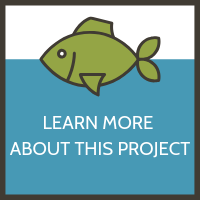By Jennifer L. Pechal, Simone Valle de Souza, Bolarin T. Omonona, Abigail Bennett, and M. Eric Benbow
Fish is an important protein source in Nigerian diets, making up almost half of their intake. Most fish are produced by small-scale fish farmers. Even though their individual outputs are low, collectively they produce more than 80% of Nigeria’s total domestic production.
A significant factor affecting Nigerian fish farmer gains is the cost of fish feed, which mainly consists of fishmeal and maize. Fishmeal is the crude protein content of fish feed usually sourced from wild-caught baitfish, but conventional fishmeal production is depleting wild fish stocks. The high expenses associated with fish production have led some fish farmers to abandon their ponds altogether.
For Agulana Okafor, a small-scale catfish farmer in Ebonyi State, Nigeria, fishmeal can represent up to 70% of total production cost. These costs are becoming unbearable to individuals, such as Okafor, whose livelihoods rely on fish farming.
Lack of safe, high-quality, cost-effective feeds impact small-scale fish farmers as they try to use available sources, such as fish offal, to formulate or compound fish feed. While these methods of self-reliant feed formulation could reduce production costs, it is unsustainable and can result in a poor quality or lack of fish availability for the local community. There is a clear need to develop safe, practical, and economic solutions to improve productivity for small-scale fish farmers, while enhancing livelihood opportunities and sustainability.
Thanks to the Feed the Future Innovation Lab for Fish project on integrating insect-to-fish (ITF) farming systems, high-quality, locally sourced fish feed will be supplemented with farmed insect larvae. The project focuses specifically on black soldier flies, which are globally recognized as a beneficial insect for alternative protein production. Their rapid development time (less than 1 month), ability to consume a wide range of organic waste materials (e.g., kitchen waste to manure), and scalability (from backyard to industrial) make them the ideal ingredient to replace current proteins in fish meal.
In addition to the current high costs of fishmeal, there is concern by local farmers over the infiltration of “fake fish feeds” in the current market. “There are a lot of adulterated feeds in the market,” Okafor said. “Participating in this work would reduce the risk of buying fake fish feeds and guarantee the quality of feeds being fed to the fish.”
Farming insects as alternative protein production is gaining acceptance among farmers across the world. However, enhancing fishmeal replacement with black soldier flies for small-scale farms in Africa is underexplored. With a relatively low implementation cost, the integrated ITF farming system has tremendous potential to impact local farmers through significant and lasting reductions in fishmeal costs.
Okechukwu Dozie, a small-fish farmer from Ebonyi State, Nigeria, said, “Now this innovation will also help to improve fish feeding management. If this concept works, profit levels will be improved. It will create more jobs for youth, and fish products will be in the market at a sufficient quantity.”
The project’s expansion will also benefit fish farmers by promoting a cleaner environment through the use of kitchen and household wastes to produce the black soldier fly larvae meal. Additionally, it conserves the marine fish that otherwise would have been caught and used for fishmeal in fish feed.
Fish farmers, local government officials, and educators participating in the establishment of the ITF farming systems in Nigeria are at the forefront of creating a platform to meet the needs of local farmers and, perhaps, provide an avenue of return for those farmers that have left aquaculture because of production costs.
This novel fish feed production system in Nigeria is projected to decrease feed costs by 30%, which will improve the livelihoods of participants and positively impact individuals along the fish production value chain.
Published January 25, 2022

